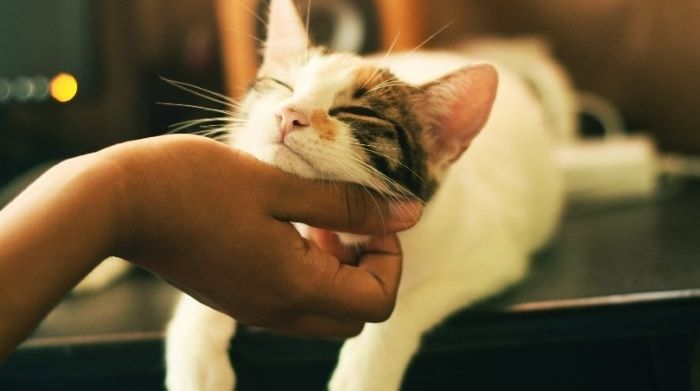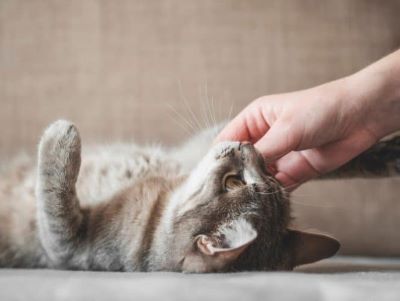cats are adorable creatures. They have elegant whispers of mystery and charming hearts with their delicate pawprints.
Imagine you and your cat are lying on the sofa in a lazy afternoon and you reach over and tickle her belly. suddenly your cat may purr, hiss, shake around, or may even bite you.
They probably like this but do they feel ticklish? Let’s find out together.

Do Cats Feel Ticklish?
While cats do share certain human-like sensory experiences, the idea of ticklishness in cats is still not fully understood.
“Cats can be ticklish but, since they don’t laugh, they show it in different ways,” says Angelica Dimock, a veterinarian at the Animal Humane Society [1].
Despite the fact that certain cats may exhibit ticklish behavior, it’s crucial to remember that each cat will react and respond differently.
Cats are typically particularly keen creatures because each part of their bodies responds to touch differently.
While some cats may like having some areas of their coat gently tickled, others may find them annoying or even itchy.

It’s critical to pay attention to your personal cat’s body language and behaviors to comprehend their preferences and comfort zones.
Additionally, the relationship between ticklishness and laughter, which is often associated with tickling in humans, may not apply to cats.
Cats display their emotions through a wide range of vocalizations, body movements, and behaviors, but laughter as a response to tickling has not been observed in felines.
Therefore, while cats may have sensitive areas or respond playfully to touch, their experiences of ticklishness are distinct from our own.
What Are the Most Common Ticklish Spots on Cats?
While most cats are distinct but still certain body points get more responses than others.
However, it’s important to remember that every cat is unique, and their sensitivity can vary. Here are some areas where cats may show more signs of ticklish feelings:
1) Under the chin: Many cats enjoy gentle strokes or tickles under their chin. Pay attention to their response, as some cats may tilt their head or lean into the touch to show their enjoyment.
2) The base of the tail: The base of a cat’s tail is another spot that can produce interesting reactions. Some cats may respond positively to light touches or gentle scratching in this area, while others may not enjoy it at all.

3) Belly and armpits: The belly region is known to be a vulnerable area for cats, but some cats may also find it enjoyable when tickled gently. Similarly, the armpits can be an area where cats are more sensitive to touch.
Approach these areas with carefulness, as not all cats enjoy being touched there, especially if they feel exposed or uneasy. Always watch for signs of discomfort and respect your cat’s boundaries.
Remember, each cat is unique in their choices, so Building trust and understanding your cat’s unique sensitivities will help create a positive and enjoyable experience for both of you.
Do Cats Like Feeling Ticklish?
Cats react to two forms of ticklish sensations. One is knismesis, or “the moving itch”—a light touch that raises goosebumps or causes our skin to twitch. This natural response also alerts us to something on our skin that needs to be removed.
The other is gargalesis, which is the heavy tickling sensation that makes us laugh.

Cats might not feel “ticklish”, but they often react in mostly the same ways as humans who might feel ticklish. Cats can’t talk, so it’s hard to ask them if what they’re feeling is ticklish.
“Cats are extremely sensitive to touch, but a little tickle on the head or face may be welcomed by some, I think what cats are responding to is a massaging touch on their cheeks, head, or back,” says Renee Rucinsky, president of ABVP.
However, Note that not all cats are the same.
FAQs
How Do You Know If Your Cat Is Ticklish?
Some common warning signs include ears back, wide eyes, freezing up (stop moving), and vocalizing. If your cat gives you any of these indications, it likely means Please stop, I’m not enjoying that.
How Do Cats Laugh?
Can Your Cat Laugh? No, your cat cannot technically laugh, but they have other signs to show that they are happy. Purring is your cat’s main way of expressing that they are happy. Some people even consider purring as equivalent to cat laughter.
Do Cats Know That You Are Smiling?
According to the experts, cats do not understand smiles and frowns independently, but they fully understand strong human emotions when expressed in more than one dimension — more due to the tone of voice than facial expressions. So, unlike interacting with dogs, smiling is not an effective way to connect with a cat.
Can Cats Feel Tickles?
Being tickled stimulates both pain and pleasure nerve receptors, which is why some people—and cats! —aren’t always fond of it.
Conclusion
Cats are well known for being energetic and like to be tickled. A cat will frequently purr or meow in response when you tickle her, indicating that she is enjoying the sensation.
Some cats may even turn over on their backs to expose their bellies as a request for more tickling. A great method to bond with your furry pet is to tickle a cat.
Both you and your cat may benefit from its ability to reduce stress and anxiety. So feel free to tickle your cat right now!
Reference:
- Animal Humane Society. (n.d.). –Animal Humane Society.

Patricia is a guardian to an exotic shorthair cat named Suz. She’s a professional cat trainer and behaviorist. She has expertise in writing on feline behavior, house training, and tips & tricks including product reviews of related products.

